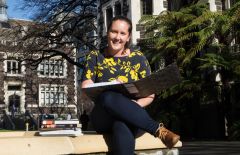Bridget Irvine has always been interested in two very distinct career pathways: psychology and the law. Bridget completed her undergraduate studies at the University of Otago in 2010, graduating with a Bachelor of Science (Honours) in Psychology and a Bachelor of Laws. Her research experience through the Department of Psychology's honours programme, however, convinced her to embark on a PhD.
“Working with Dr Rachel Zajac has provided me with a unique perspective on how science is integrated into the law. Unfortunately, these two distinct fields do not make very good bedfellows.”
Bridget's research focuses on the way in which children are cross-examined in the courtroom.
“Unfortunately, we know that children can have trouble maintaining consistency when the questions that lawyers pose are leading, complex, and challenging to their credibility. When faced with these types of qustions, children are highly likely to change their testimony, irrespective of the truth."
The focus of Bridget's research has been examining the efficacy of a courtroom preparation intervention that gives children practice a answering the types of challenging questions they could face in the courtroom, albeit about a topic unrelated to their 'testimony'. To date, the Marsden-funded studies conducted in the laboratory have produced very encouraging findings.
In 2013, Bridget was given the opportunity to combine her two distinct interests in one role – as the coordinator of Innocence Project New Zealand (IPNZ). IPNZ offers pro bono legal assistance to individuals who maintain that they are factually innocent. Bridget coordinates the work conducted by a group of academics and students from the Department of Psychology and Faculty of Law at the University of Otago and Victoria University of Wellington. IPNZ is a member of the Innocence Network, which is the international organisation that investigates wrongful convictions. Collectively, the Innocence Network has identified and helped to overturn 330 wrongful convictions.
"Unfortunately, many of the contributors to wrongful conviction - mistaken eyewitness identification, false confessions, bias in forensic decision-making - fall squarely into the territory of psychological scientists, but it is extraordinarily diffiuclt to convence the courts to apply what we know now to old cases. Innocene Projects aorund the world have been crucial in making that happen."
Bridget is quick to point out that her life in the Psychology Deaprtment isn't all work and no play. She is the founding member of the Otago Psychology Student Committee (OPSYC) and has been actively involved in running the social events held within the Department. Bridget states that a highlight of this role was the production of the magazine 'think.'.
It was always such a risk for the Department to take a chance on a bunch of amateurs, but I am really glad they gave us the opportunity to create a magazine that really showcased our fantasic Department."

Bridget Irvine, Department of Psychology PhD Candidate
